| کد مقاله | کد نشریه | سال انتشار | مقاله انگلیسی | نسخه تمام متن |
|---|---|---|---|---|
| 2640241 | 1563523 | 2011 | 7 صفحه PDF | دانلود رایگان |

BackgroundIn the 2003 severe acute respiratory syndrome outbreak, finding viral nucleic acids on hospital surfaces suggested surfaces could play a role in spread in health care environments. Surface disinfection may interrupt transmission, but few data exist on the effectiveness of health care germicides against coronaviruses on surfaces.MethodsThe efficacy of health care germicides against 2 surrogate coronaviruses, mouse hepatitis virus (MHV) and transmissible gastroenteritis virus (TGEV), was tested using the quantitative carrier method on stainless steel surfaces. Germicides were o-phenylphenol/p-tertiary amylphenol) (a phenolic), 70% ethanol, 1:100 sodium hypochlorite, ortho-phthalaldehyde (OPA), instant hand sanitizer (62% ethanol), and hand sanitizing spray (71% ethanol).ResultsAfter 1-minute contact time, for TGEV, there was a log10 reduction factor of 3.2 for 70% ethanol, 2.0 for phenolic, 2.3 for OPA, 0.35 for 1:100 hypochlorite, 4.0 for 62% ethanol, and 3.5 for 71% ethanol. For MHV, log10 reduction factors were 3.9 for 70% ethanol, 1.3 for phenolic, 1.7 for OPA, 0.62 for 1:100 hypochlorite, 2.7 for 62% ethanol, and 2.0 for 71% ethanol.ConclusionOnly ethanol reduced infectivity of the 2 coronaviruses by >3-log10 after 1 minute. Germicides must be chosen carefully to ensure they are effective against viruses such as severe acute respiratory syndrome coronavirus.
Journal: American Journal of Infection Control - Volume 39, Issue 5, June 2011, Pages 401–407